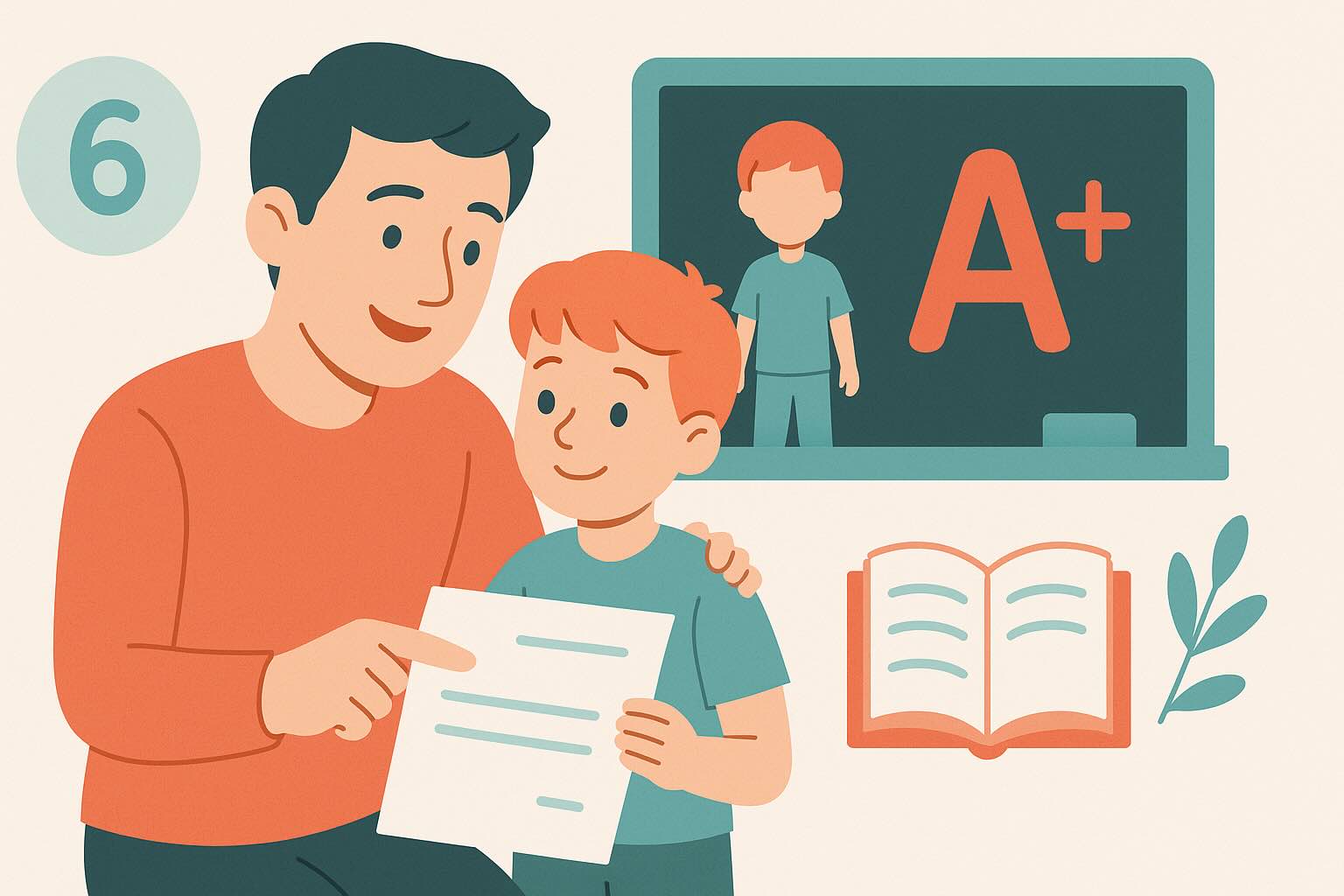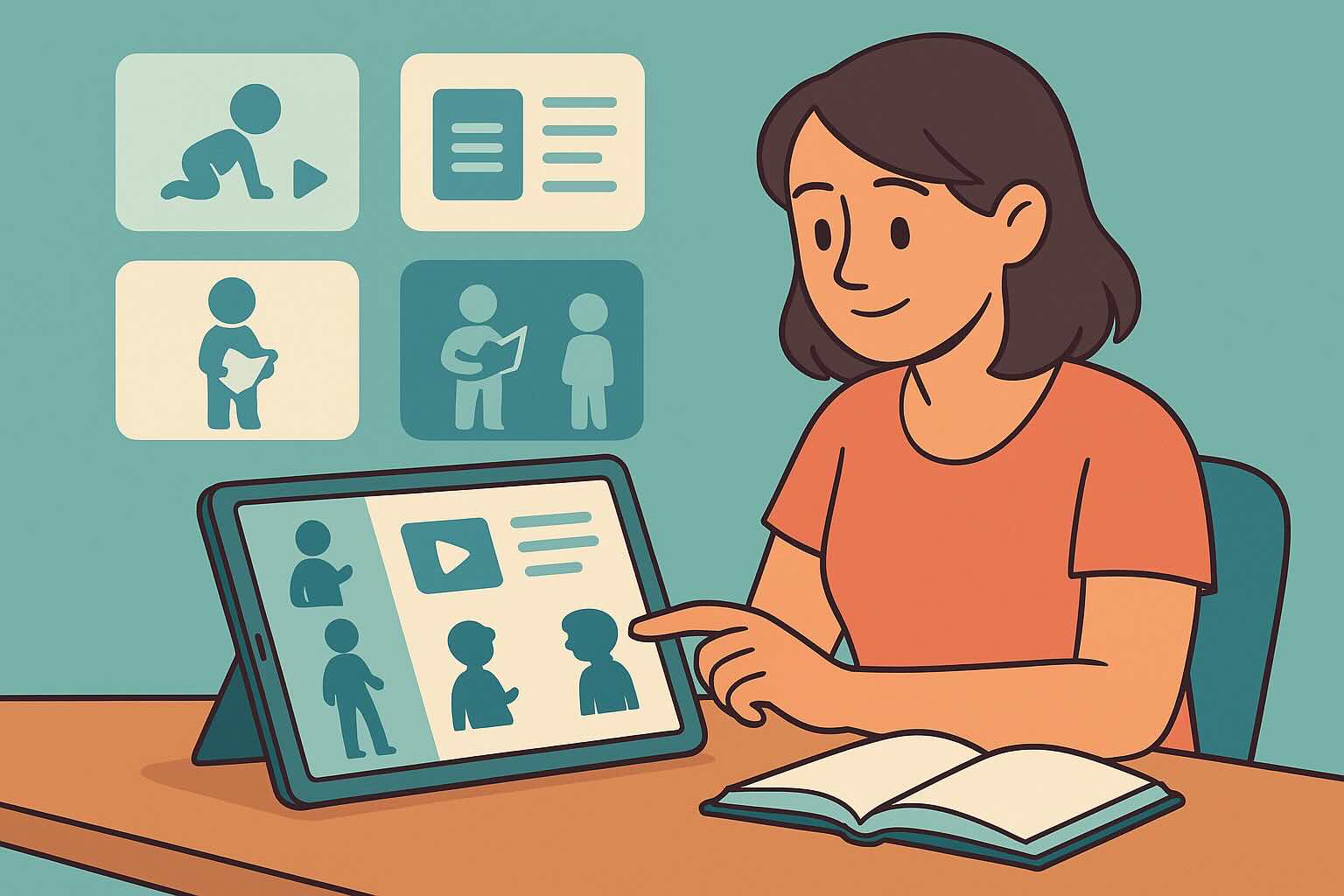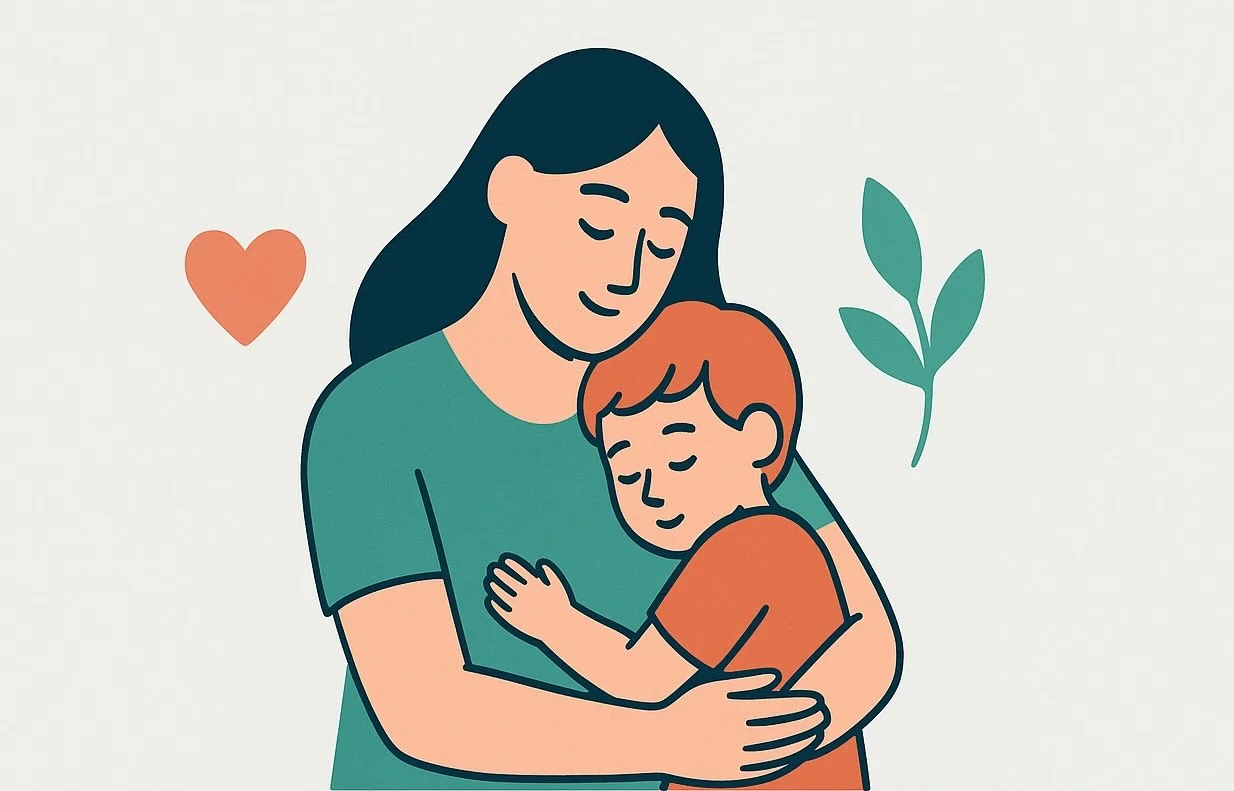6 Year Old Milestones: Complete Development Guide for Parents


Your 6-year-old is embarking on one of childhood's most significant adventures—elementary school! This pivotal year brings tremendous growth in independence, academic skills, and social sophistication. Understanding typical developmental milestones helps you support your child's journey while recognizing when additional guidance might be beneficial.
The Six-Year-Old Transformation
Six marks the official transition from early childhood to the school-age years. Your child is developing the sustained attention, emotional regulation, and social skills needed for classroom success. According to current developmental guidelines, this is when children typically demonstrate the foundational skills that will support years of academic learning.
This year your child becomes increasingly aware of rules, fairness, and social hierarchies. They're developing genuine friendships, tackling academic challenges, and showing remarkable growth in independence. Their world is expanding beyond family to include teachers, classmates, and structured learning environments.
The physical, cognitive, and emotional changes happening now create the foundation for all future learning. Your 6-year-old is becoming a student, a friend, and an increasingly independent person with their own thoughts, preferences, and capabilities.
Physical Development Milestones
Gross Motor Skills
Six-year-olds demonstrate impressive coordination and physical confidence. Most children this age can:
Advanced Movement Abilities:
- Ride a bicycle without training wheels (many children)
- Skip rope for several consecutive jumps
- Hop on each foot alternately
- Walk on a balance beam forward and backward
- Throw and catch balls with accuracy
- Jump rope backward (some children)
- Do jumping jacks coordinated
- Gallop, skip, and march in rhythm
- Climb playground equipment with agility
- Balance on one foot for 10+ seconds
Sports and Physical Activities:
- Participate in organized sports with basic rules
- Show improved hand-eye coordination in ball games
- Demonstrate beginning swimming strokes
- Use playground equipment independently and safely
- Show spatial awareness in physical activities
- Coordinate movements with music or rhythm
- Display increased strength and endurance
Body Awareness:
- Understand personal space boundaries
- Show awareness of body position and movement
- Demonstrate left and right directionally (emerging)
- Control movements according to space and situation
- Adjust physical behavior for different environments
These physical advances reflect significant brain development in areas controlling movement, balance, and spatial processing. Your child's growing abilities support their participation in team activities and structured sports.
Fine Motor Skills
Small muscle control reaches new levels of precision at age 6:
Hand and Finger Coordination:
- Write letters and numbers legibly (most of the alphabet)
- Draw a person with 12 or more body parts
- Copy complex shapes including diamonds
- Cut along curved lines with scissors
- Tie shoes independently
- Use tools appropriately (hammer, screwdriver, stapler)
- Build detailed structures with small pieces
- Handle small objects precisely
Academic Fine Motor Skills:
- Hold pencils with mature tripod grip consistently
- Write within lines and control letter size
- Erase and correct work neatly
- Use rulers and other academic tools
- Manipulate math manipulatives effectively
- Create detailed artwork with various media
- Complete intricate crafts and projects
Daily Living Skills:
- Button small buttons and manipulate zippers
- Brush teeth thoroughly
- Comb hair appropriately
- Help prepare simple foods safely
- Organize materials and belongings
- Handle money and small objects
These fine motor achievements are essential for academic success, particularly in writing, drawing, and detailed project work that becomes increasingly important in elementary school.
Cognitive Development Milestones
Academic Skills
Your 6-year-old's cognitive abilities are rapidly expanding to support formal academic learning:
Reading and Literacy:
- Recognize and name all uppercase and lowercase letters
- Know letter sounds and basic phonics rules
- Read simple books with familiar words
- Sound out unfamiliar words using phonics strategies
- Understand that print carries meaning and follows rules
- Identify beginning, middle, and ending sounds in words
- Read simple sight words fluently
- Retell stories with main events in sequence
- Make predictions about story outcomes
Mathematics Concepts:
- Count to 100 and beyond
- Recognize numbers 1-20 and many beyond
- Understand concepts of addition and subtraction with sums to 10
- Compare numbers using greater than, less than, equal to
- Identify patterns and extend them
- Understand basic measurement concepts
- Recognize and name shapes and their attributes
- Sort and classify objects by multiple characteristics
- Understand basic concepts of time (days, months, seasons)
Writing Skills:
- Write first and last name clearly
- Form letters correctly with appropriate size and spacing
- Write simple sentences with capital letters and periods
- Spell common short words correctly
- Express ideas through writing (with invented spelling)
- Understand basic punctuation rules
- Write from left to right consistently
Problem-Solving and Thinking Skills
Six-year-olds demonstrate increasingly sophisticated thinking abilities:
Cognitive Processing:
- Pay attention to tasks for 15-20 minutes
- Follow multi-step instructions (4-5 steps)
- Complete 25-50 piece puzzles
- Think logically about concrete problems
- Understand cause and effect relationships clearly
- Make simple inferences and draw conclusions
- Plan ahead for activities and projects
- Organize thoughts and materials systematically
Memory and Learning:
- Remember and follow daily routines independently
- Recall information from previous days or weeks
- Learn new information quickly and apply it
- Make connections between new and previous learning
- Remember important personal and academic information
- Follow complex game rules and procedures
- Retain and use academic content across subjects
Abstract Thinking:
- Understand concepts of time more accurately
- Grasp basic concepts of fairness and rules
- Think about hypothetical situations
- Understand different perspectives (beginning theory of mind)
- Process abstract concepts like honesty, kindness, and responsibility
- Make simple predictions and test them
The ability to sustain attention and process complex information makes 6-year-olds ready for the academic demands of elementary school.
Language and Communication Development
Expressive Language Skills
Six-year-olds become sophisticated communicators with expanding language abilities:
Speaking and Conversation:
- Use sentences with 6-9 words regularly
- Speak clearly and fluently in most situations
- Tell detailed stories with beginning, middle, and end
- Describe events in logical sequence
- Use complex grammar including subordinate clauses
- Ask detailed questions to gain information
- Express abstract concepts and emotions clearly
- Negotiate and problem-solve verbally
- Use appropriate tone and volume for different situations
Vocabulary and Language Use:
- Use vocabulary of 8,000-14,000 words
- Learn new words quickly from context
- Use descriptive language effectively
- Understand and use figurative language (simple metaphors)
- Modify language for different audiences
- Use humor appropriately in conversation
- Express opinions and justify reasoning
- Discuss past and future events in detail
Academic Language:
- Use subject-specific vocabulary appropriately
- Explain thinking and problem-solving processes
- Participate in classroom discussions effectively
- Ask questions to clarify understanding
- Follow and give detailed instructions
- Present information to groups
- Use formal language when appropriate
Receptive Language Skills
Understanding complex language becomes increasingly sophisticated:
Comprehension Abilities:
- Follow complex, multi-step instructions
- Understand stories with multiple characters and plot lines
- Process abstract concepts and ideas
- Understand humor, sarcasm, and figurative language (beginning)
- Comprehend academic content across subjects
- Understand different meanings of words based on context
- Process complex questions and respond appropriately
- Follow classroom discussions and academic presentations
Six-year-olds can engage in sophisticated academic discussions, understand complex texts, and process abstract concepts, showing readiness for grade-level academic content.
Support your child's communication development →
Social and Emotional Development
Emotional Regulation and Maturity
Six-year-olds show significant improvement in emotional understanding and control:
Emotional Skills:
- Identify and express a wide range of emotions
- Understand emotional causes and consequences
- Use coping strategies when frustrated or upset
- Calm down independently within 10-15 minutes
- Show empathy and concern for others' feelings
- Handle disappointment and setbacks more maturely
- Express needs and feelings appropriately
- Seek help when needed without excessive distress
Self-Control and Regulation:
- Control impulses in group settings consistently
- Wait appropriately for turns and attention
- Follow rules even when not directly supervised
- Accept consequences for actions
- Transition between activities smoothly
- Handle changes in routine with flexibility
- Show patience during delays or waiting periods
Self-Awareness:
- Understand personal strengths and challenges
- Show awareness of how behavior affects others
- Demonstrate self-confidence in abilities
- Accept feedback and correction appropriately
- Show pride in accomplishments without excessive boasting
- Understand personal preferences and interests
Social Skills and Peer Relationships
Friendships and social interactions become increasingly important:
Peer Interaction:
- Form genuine friendships with shared interests
- Play cooperatively in groups of 3-5 children
- Share and take turns willingly
- Include others in activities appropriately
- Resolve conflicts through discussion and compromise
- Show loyalty and support for friends
- Understand social hierarchies and group dynamics
- Demonstrate good sportsmanship in games and competitions
Social Communication:
- Read social cues accurately most of the time
- Use appropriate social language and manners
- Show interest in others' experiences and feelings
- Maintain friendships over time
- Navigate different social situations appropriately
- Show respect for authority figures
- Demonstrate classroom social skills effectively
Leadership and Cooperation:
- Take leadership roles when appropriate
- Follow others' leadership willingly
- Contribute ideas to group projects
- Work toward common goals effectively
- Show responsibility for group success
- Help classmates when needed
- Model appropriate behavior for younger children
Independence and Responsibility
Six-year-olds take pride in their growing independence and capability:
Self-Care and Daily Living:
- Complete morning and bedtime routines independently
- Choose appropriate clothing for weather and activities
- Pack school materials and supplies
- Manage personal belongings responsibly
- Handle money for simple purchases
- Follow safety rules without constant reminders
- Take care of pets or plants with minimal supervision
Academic Responsibility:
- Complete homework assignments independently (with some support)
- Remember and bring school materials home
- Follow classroom rules and procedures
- Take responsibility for academic performance
- Ask for help when struggling with assignments
- Organize materials and workspace effectively
- Follow through on commitments and agreements
Explore emotional development strategies →
School Success Indicators
Academic Performance
Six-year-olds should demonstrate several key indicators of school success:
Learning Behaviors:
- Show curiosity and ask thoughtful questions
- Persist when academic tasks are challenging
- Try new activities and subjects willingly
- Accept guidance and instruction from teachers
- Work independently on assignments for appropriate periods
- Show pride in learning and academic achievement
- Transfer learning from one subject to another
Classroom Participation:
- Participate actively in class discussions
- Follow classroom routines and procedures
- Listen attentively during instruction
- Complete assignments within given timeframes
- Ask for help when confused or struggling
- Show respect for learning environment
- Contribute positively to classroom community
Social-Emotional School Success
Success in elementary school depends heavily on social-emotional skills:
Classroom Behavior:
- Separate from parents without distress
- Interact respectfully with teachers and staff
- Follow school rules and expectations
- Show kindness and respect for classmates
- Handle academic frustration appropriately
- Demonstrate resilience when facing challenges
- Show enthusiasm for school and learning
Peer Relationships at School:
- Make friends and maintain school friendships
- Include others in activities and games
- Resolve conflicts peacefully
- Show empathy for classmates' feelings
- Work cooperatively on group projects
- Demonstrate good citizenship in school community
Red Flags: When to Seek Professional Guidance
While children develop at individual rates, certain signs warrant discussion with your pediatrician, teacher, or school counselor:
Physical Development Concerns
- Significant delays in gross motor skills (can't hop, skip, or balance)
- Difficulty with fine motor tasks needed for school (writing, cutting, drawing)
- Frequent falls or coordination problems
- Inability to ride a bicycle or engage in age-appropriate physical activities
- Significant delays compared to peers in physical abilities
- Loss of previously acquired physical skills
- Extreme difficulty with sports or movement activities
Cognitive Development Concerns
- Cannot recognize most letters or their sounds
- Shows no progress in reading readiness skills
- Cannot count to 20 or recognize basic numbers
- Difficulty following 2-3 step instructions
- Cannot complete age-appropriate puzzles (20+ pieces)
- Shows no interest in academic learning
- Significant difficulty with memory or attention
- Cannot write own name clearly
Language Development Concerns
- Speech is difficult for teachers and peers to understand
- Uses very simple sentences compared to peers
- Difficulty expressing needs and thoughts clearly
- Cannot retell simple stories or events
- Shows little interest in books or stories
- Significant delays in vocabulary development
- Cannot engage in back-and-forth conversations
- Difficulty understanding classroom instructions
Social-Emotional Concerns
- Cannot separate from parents for school
- Shows extreme aggression or withdrawal in social situations
- Cannot make or maintain any friendships
- Displays extreme emotional reactions disproportionate to situations
- Cannot follow classroom rules or routines
- Shows no empathy for others
- Extreme anxiety that interferes with school participation
- Cannot regulate emotions appropriately for classroom setting
Academic Concerns
- Shows no interest in learning or school activities
- Cannot attend to tasks for developmentally appropriate periods
- Extreme difficulty with beginning academic skills
- Cannot function in classroom environment
- Shows significant regression in previously acquired skills
- Extreme frustration with age-appropriate academic expectations
When to Take Action
If you notice several concerns in one area, or if your child shows significant delays compared to peers, contact your pediatrician or speak with your child's teacher. Many schools offer evaluation services and support programs. Early intervention can make a significant difference in your child's academic and social success.
Remember, some children need extra time or different approaches to develop certain skills. This doesn't indicate a problem—it indicates a need for individualized support.
Supporting Your 6-Year-Old's Development
Physical Development Support
Gross Motor Activities:
- Encourage participation in sports and physical activities
- Provide opportunities for outdoor play and exploration
- Create obstacle courses and movement challenges
- Practice specific skills like bike riding and ball games
- Join community sports programs or classes
- Emphasize fun and effort over competition
Fine Motor Development:
- Provide varied art supplies and creative materials
- Encourage writing and drawing activities
- Practice cutting, pasting, and detailed craft projects
- Play games that require fine motor precision
- Teach practical skills like tying shoes and using tools
- Support homework and school projects that require fine motor skills
Cognitive Development Support
Academic Enhancement:
- Read together daily and discuss stories in depth
- Practice math concepts through games and real-life applications
- Encourage questioning and provide detailed explanations
- Visit educational sites like museums, libraries, and science centers
- Support homework with guidance, not answers
- Choose educational screen time and limit recreational viewing
Thinking Skills:
- Play strategy games and puzzles regularly
- Encourage problem-solving in daily situations
- Ask open-ended questions about experiences and learning
- Support planning and organizational skills
- Model logical thinking and reasoning processes
- Encourage experimentation and hypothesis testing
Language Development Activities
Communication Enhancement:
- Have daily conversations about school, friends, and interests
- Encourage storytelling and creative narratives
- Play word games, riddles, and language puzzles
- Expand vocabulary through varied reading materials
- Model sophisticated language use in daily conversations
- Encourage presentation skills and public speaking
Academic Language Support:
- Discuss schoolwork using appropriate academic vocabulary
- Help with reading comprehension through discussion
- Support writing activities with encouragement and gentle guidance
- Practice spelling and phonics skills through games
- Encourage reading independence while remaining available for support
Social-Emotional Development Support
Emotional Skills:
- Help identify and discuss emotions regularly
- Teach coping strategies for frustration and disappointment
- Model appropriate emotional responses
- Validate feelings while maintaining appropriate expectations
- Encourage emotional expression through art, writing, or conversation
- Provide comfort during difficult emotional experiences
Social Skills Development:
- Facilitate playdates and social opportunities
- Discuss social situations and appropriate responses
- Model kindness, empathy, and respect in your interactions
- Teach conflict resolution strategies
- Encourage participation in group activities
- Support friendships while allowing independence
School Success Support:
- Maintain positive communication with teachers
- Create organized homework and study spaces
- Establish consistent routines for school preparation
- Show interest in and support school activities
- Encourage responsibility for school materials and assignments
- Celebrate academic efforts and progress
Learn more about school preparation →
Common Parent Questions About 6-Year-Old Development
How can I tell if my child is adjusting well to elementary school?
Look for signs of successful adjustment including: enthusiasm about school most days, forming friendships with classmates, completing assignments appropriately, following classroom rules, and showing academic progress. Some initial anxiety or resistance is normal, but these should decrease within the first month or two of school.
Should I be concerned if my 6-year-old still has difficulty with emotional regulation?
Six-year-olds should show significant improvement in emotional control compared to preschool years. Occasional emotional outbursts are normal, especially when tired or stressed, but they should be able to calm down within 15 minutes and use words to express frustration most of the time. If emotional difficulties interfere with school or relationships, consider consulting with your child's teacher or counselor.
What if my child is struggling academically in first grade?
Academic struggles in first grade are not uncommon and don't necessarily indicate long-term problems. Communicate regularly with your child's teacher about specific areas of difficulty. Many children need extra support or time to develop certain skills. Schools often provide intervention services for children who need additional academic support.
How can I support my child's friendship development?
Encourage social opportunities through playdates, community activities, and school events. Help your child develop social skills by modeling kindness and empathy. Discuss friendship challenges when they arise and provide guidance without solving problems for them. Remember that quality matters more than quantity in friendships.
Is it normal for my 6-year-old to still need help with daily routines?
While 6-year-olds should be increasingly independent, they still benefit from structure and support. They should be able to complete most self-care tasks independently but may need reminders for complex routines or new expectations. Gradually increase independence while providing support as needed.
How much homework support should I provide?
Provide a quiet, organized space and be available for help, but encourage independence. Help your child understand assignments and provide guidance when they're stuck, but avoid doing the work for them. If homework consistently takes much longer than recommended time guidelines, discuss this with the teacher.
Building Academic Success
Reading Development
Support your child's reading growth through:
- Daily reading together, taking turns or reading simultaneously
- Discussing stories, characters, and plot developments
- Providing books at your child's independent reading level
- Encouraging reading for pleasure, not just school assignments
- Visiting libraries regularly and letting your child choose books
- Being patient with reading pace and celebrating progress
Mathematics Understanding
Help your child develop mathematical thinking by:
- Using math in daily activities (cooking, shopping, measuring)
- Playing number games and mathematical puzzles
- Discussing mathematical concepts in concrete terms
- Supporting homework with manipulatives and visual aids
- Showing enthusiasm for mathematical problem-solving
- Connecting math learning to real-world applications
Writing Skills Development
Support writing development through:
- Encouraging journal writing or storytelling
- Providing varied writing materials and opportunities
- Celebrating creative expression over perfect mechanics
- Helping with letter formation and spacing when needed
- Discussing ideas before writing to help with organization
- Reading your child's writing with interest and enthusiasm
The Elementary School Journey
Your 6-year-old is at the beginning of a remarkable educational journey. The skills they develop this year—academic, social, and emotional—will serve as building blocks for all future learning. This is a time of tremendous growth, challenge, and achievement.
Remember that adjustment to elementary school varies among children. Some thrive immediately in the structured environment, while others need time to adapt to new expectations and routines. Both patterns are normal and don't predict long-term success.
Supporting School Success:
- Maintain regular communication with teachers
- Show interest in your child's school experiences
- Celebrate efforts and progress, not just achievements
- Provide consistent support and encouragement
- Trust your child's ability to meet age-appropriate challenges
- Seek help when concerns arise
Fostering Love of Learning:
- Model curiosity and enthusiasm for new information
- Support your child's interests and questions
- Provide varied learning experiences outside school
- Show that mistakes are part of learning
- Celebrate discovery and understanding
- Connect learning to real-world applications
Your 6-year-old is developing the foundation skills that will support years of academic success. By understanding their developmental needs and providing appropriate support, you're helping them build confidence, competence, and a lifelong love of learning.
Celebrating Growth and Individuality
Every 6-year-old develops at their own pace, and this individual variation is both normal and healthy. Some children may excel in reading while developing math skills. Others might show strong social skills while working on academic concepts. This diversity reflects the complexity of child development and the unique strengths each child brings to their learning journey.
Celebrate When Your Child:
- Shows effort and persistence in challenging tasks
- Demonstrates kindness and empathy toward others
- Expresses curiosity and asks thoughtful questions
- Takes responsibility for belongings and assignments
- Shows pride in accomplishments and learning
- Develops independence in self-care and daily routines
- Forms positive relationships with teachers and peers
Provide Additional Support When:
- They seem overwhelmed by academic or social expectations
- They show signs of school avoidance or extreme anxiety
- They need help developing specific academic or social skills
- They benefit from breaking complex tasks into smaller steps
- They require more time to master certain concepts
- They would benefit from additional practice or resources
Remember that your role is to advocate for your child's individual needs while supporting their growth toward independence. By understanding typical development while honoring your child's unique timeline and strengths, you create optimal conditions for their success.
The six-year-old year is foundational—full of new challenges, exciting discoveries, and significant growth. Trust in your child's ability to learn and adapt, provide consistent support and encouragement, and celebrate the remarkable journey of watching them become a confident, capable student ready for the adventures of elementary school and beyond.
This year marks the beginning of your child's formal education journey, but more importantly, it's a time when they're discovering their own capabilities, interests, and potential. With your support and understanding, they'll develop not just academic skills, but the confidence, resilience, and love of learning that will serve them throughout their educational journey and beyond.
24/7 AI Parenting Assistant
Get instant, personalized advice with expert-curated parenting knowledge. Chat with your AI coach anytime, anywhere.

Expert Content Library
Access multimedia resources, articles, and expert-reviewed content organized by topics and your child's age.

Connection Before Correction Toolkit
Daily practices and scripts to build strong parent-child relationships that make behavior guidance more effective.
Frequently Asked Questions
Need personalized support?
RootWise's AI coach can provide tailored strategies for your specific situation, available 24/7 when you need it most.
Learn More About AI Coaching →



